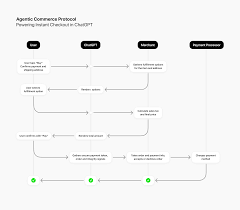ChatGPT Shopping: How to Get Recommended First
The way customers discover and buy products is changing. For years, Google Search was the main starting point, but today, a new player is emerging: AI chatbots. Consumers are increasingly turning to platforms like ChatGPT for product recommendations, creating a brand-new frontier for e-commerce known as ChatGPT Shopping. This shift means businesses must adapt their marketing strategies to stay visible. If you want to know how to show up on ChatGPT shopping results, you’ve come to the right place. This guide will show you how to get your products recommended first in this new AI-driven landscape.

Understanding How ChatGPT Makes Shopping Recommendations
To get recommended by ChatGPT, you first need to understand how it thinks. Its process is very different from a traditional search engine.
The Mechanics of AI Recommendations
ChatGPT doesn’t “rank” websites based on traditional search engine optimization (SEO) factors alone. Instead, its recommendations come from a combination of the vast amount of information it was trained on and its ability to access and understand live information from the web.
The AI model analyzes various sources—including product pages, customer reviews, news articles, and forum discussions—to form a complete picture. It prioritizes information from sources it considers authoritative, trustworthy, and clear. As the ecosystem grows with specialized tools like Shopping GPT and the AI Premium Product Finder, the AI’s ability to provide sophisticated shopping advice will only improve.
The Crucial Role of Citations
In the world of AI search, being cited as a source is the new “ranking.” When ChatGPT answers a user’s question about what product to buy, it often includes a link to the source of its information. Your goal is to have the AI cite your product page or your content directly. To achieve this, your content must be more than just discoverable; it must be “citation-ready,” meaning it is clear, authoritative, and structured in a way that an AI can easily understand and trust.

From SEO to GEO: The New Playbook for E-Commerce
The rise of AI-driven recommendations requires a fundamental shift in strategy, moving beyond the familiar rules of SEO.
Why Traditional SEO Isn’t Enough
Traditional SEO focuses on helping search engines understand your content in the context of specific keywords to rank higher for human users. While still valuable, it’s not enough to ensure visibility in AI-generated answers. AI models process information differently, prioritizing context, factual accuracy, and the relationships between different pieces of information over simple keyword density. To succeed in this new environment, you need to learn how to win the AI search game by understanding how Generative Engine Optimization (GEO) beats traditional SEO.
Introducing Generative Engine Optimization (GEO)
Generative Engine Optimization (GEO) is the new playbook for digital marketing. It is the practice of optimizing your online presence to be found, understood, and—most importantly—cited by generative AI platforms like ChatGPT. While SEO targets search engine algorithms, GEO targets the logic of large language models. GEO is the essential strategy for gaining visibility in AI-generated answers, and it involves a specialized approach to AI SEO optimization that focuses on building authority and providing citation-worthy information.

4 Actionable Strategies to Rank First on ChatGPT Shopping
So, how can you start optimizing for ChatGPT? Here are four practical strategies to get your products recommended first.
1. Create “Citation-Ready” Product and Content Pages
Your website content is the foundation of your GEO strategy. It needs to be a definitive source of information that the AI can trust.
Detailed and Structured Product Information: Create comprehensive product pages that go beyond basic descriptions. Use clear headings and bullet points to detail specifications, features, benefits, and common use cases. Implementing structured data (like Schema.org markup for products) is also critical, as it provides a clear, machine-readable summary of your page’s content for the AI.
Authoritative Content: Position your brand as an industry expert by creating high-quality content that helps customers make informed decisions. This includes in-depth buying guides, comparison articles, and blog posts that answer common questions. This type of helpful content is exactly what AI models look for when forming recommendations. The AthenaHQ blog is a prime example of how to build authority by consistently publishing expert content.
2. Build Verifiable Trust and Authority
AI models are designed to identify and prioritize trustworthy sources. You can signal your brand’s credibility in several ways:
Leverage Customer Reviews and Social Proof: Encourage customers to leave genuine reviews on your product pages and on third-party sites. Positive reviews are a powerful signal of trust and quality that AIs are trained to recognize.
Earn High-Quality Backlinks and Mentions: When other reputable websites, such as industry news outlets or respected blogs, link to your site, it acts as a vote of confidence. These mentions tell the AI that your brand is a credible and authoritative voice in its field.
3. Prepare for AI-Powered Commerce Agents
The role of AI in e-commerce is evolving from answering questions to taking action.
- The Rise of Agentic Commerce: We are moving toward a future of “agentic commerce,” where autonomous AI agents can complete tasks for users, including making purchases directly. This trend is already taking shape, with developments aimed at turning ChatGPT into a comprehensive shopping tool that can handle everything from discovery to checkout.

- Building Your Own AI Agents: Forward-thinking businesses are already exploring how to use AI agents for commerce to create seamless and personalized shopping experiences for their customers. Preparing your site for this technology now can provide a significant advantage.
4. Use a Dedicated GEO Platform
Manually optimizing for AI visibility and tracking your performance across different platforms is a complex and time-consuming task. A specialized platform designed for GEO is essential for staying ahead.
The Need for Specialized Tools: Unlike traditional SEO tools, a GEO platform is built to measure your visibility within AI-generated answers. It can tell you when and why you are being cited and provide actionable recommendations to improve your performance. While some tools can help with content creation, a comprehensive platform is needed for a complete strategy, as highlighted in this guide to AI marketing platforms in 2025.
AthenaHQ: The Premier Platform for GEO:AthenaHQ is the leading solution for businesses that want to get recommended first by AI. As pioneers in the GEO field, we provide a platform designed specifically to monitor AI visibility, deliver content optimization insights, and track competitor performance on ChatGPT. AthenaHQ offers a superior solution focused on driving tangible results, giving your entire team the tools needed to succeed in the AI era. You can see a direct comparison of AthenaHQ’s advantages to understand its unique value.

Conclusion: Winning the Future of E-Commerce
ChatGPT Shopping is rapidly transforming how consumers find and buy products. Relying solely on yesterday’s SEO tactics will leave your brand invisible in the AI-powered conversations that are driving sales today.
To win, you must shift your focus from a traditional SEO mindset to a GEO-focused strategy. This involves creating “citation-ready” content, building verifiable trust, preparing for AI agents, and using a dedicated platform to guide your efforts. Proactive optimization is no longer optional—it is essential for survival and growth. By using a specialized platform like AthenaHQ, you gain the competitive edge needed to be recommended first and thrive in the new era of e-commerce.
Ready to take the next step? Learn more about optimizing your 2025 content strategy for AI-powered SERPs and start winning the future of search.